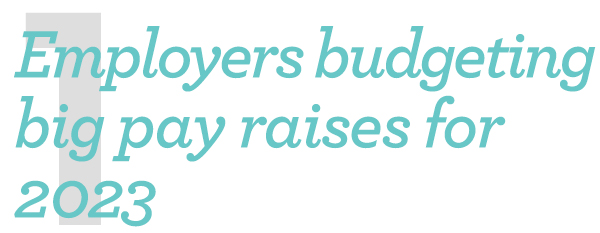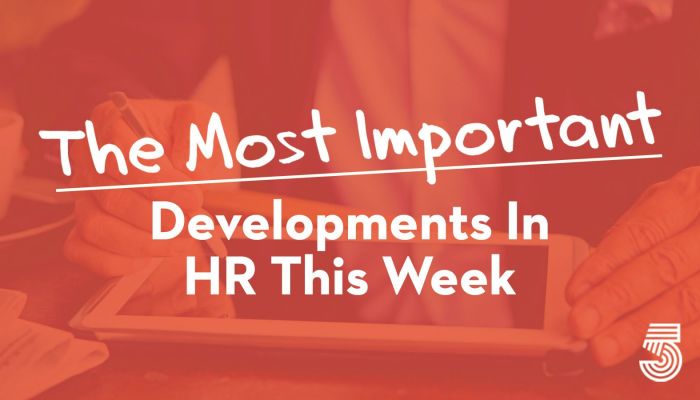The M.I.D., as we call it, is curated by our editorial team from more than 50 news sources. Like a lot of good ideas, this started as something I wanted for myself. If I can’t read everything, I at least want to stay abreast of the most important developments.
This week in HR, employers grappled with pay raises and considered metaverse offices (no), Bersin research found high growth at companies = a skilled HR team, we learned leaders have a self-awareness problem and hybrid open enrollment loomed on the horizon.


In response to a tight labor market, employers are planning to up employee salaries in the biggest projected hike in 15 years, new data from Willis Towers Watson finds. Although it’s a new recent high, it’s not by much: Companies, on average, are budgeting a 4.1% salary increase for 2023, just above this year’s average 4% increase. The 2022 and 2023 salary increases are the largest since the Great Recession of 2008, according to the consulting firm, which surveyed 1,430 employers for insights in April and May. Nearly two in three (64%) U.S. companies are budgeting for higher pay raises than last year, while two-fifths (41%) increased their budgets since original projections were made earlier this year, the survey found. Less than half of companies (45%) are sticking with the pay budgets they set at the start of the year. Concerns over the hot job market — which is seeing a record number of employees leave their jobs for better opportunities — are overwhelmingly driving salary increases, with nearly three in four survey respondents (73%) citing the competitive market as their top factor. That’s followed by employee expectations for higher increases that are driven by inflation (cited by 46% of respondents) and anticipation of stronger financial results (cited by 28%). HRE


The metaverse is here. Who is willing to embrace it? Only 42% of employees are “very familiar” with the metaverse — an immersive, tech-driven world that embraces augmented and virtual reality — compared to 69% of employers, according to a recent survey conducted by VPN service provider ExpressVPN. When asked about their interest in immersive work, 77% of employers said they were interested in experimenting, while only 57% of employees agreed. “The metaverse is quickly gaining traction as a way to make remote work more efficient, and the idea of a traditional in-office work environment is now becoming a thing of the past,” says Harold Li, vice president of ExpressVPN. “However, the metaverse doesn’t come without its challenges, and employees are concerned about what this means for their privacy, primarily the surveillance of their real-time location, screen monitoring, and even eye tracking.” For employers, a completely immersive virtual office space means there is no longer a need to pay rent and utilities at a physical office or purchase office supplies, Li explains. It will also create more competition for jobs, as employee location won’t matter as much, making it easier for companies to hire top talent globally. Most notably, the ability to monitor a remote workforce will become easier for employers concerned about productivity. EBN


We have been analyzing data in our Global HR Capability Project and the results are striking. Among the 7,300 HR professionals who have completed our assessment, the highest growth companies have significantly deeper HR skills in very important areas. What we found is important: High-growth companies have HR teams that can partner with senior leaders, coach managers and executives, and have a deep understanding of the business’s operations. In other words, they are close to the business and they have credibility and experience in the business. But there’s more. Note that these high-performing companies have a well-defined HR operating model, they have strong skills in corporate learning and learning technology, and they are good performance consultants. These skills are critical for growth because these companies are hiring, expanding their offerings, and rapidly moving people to new positions. Josh Berin


Good leaders understand what their employees need. However, the power associated with leadership frequently makes it difficult to retain the empathy and awareness necessary to be a good leader. A new study by leadership development firm AceUp surveyed more than 600 people, at various levels of leadership, to see just how well executives are responding to their employees’ needs. Here are some key findings from the report: Seventy-four percent of executives think they are inspiring their employees, but only 27% of employees agree. Furthermore, 62% of senior leaders believe they are doing a good job of retaining employees, but only 27% of employees agree with this statement. Meanwhile, 66% of senior leaders believe their company has a clear career path for each employee, but only 35% of employees agree with this. Over half of employees believe soft skills are necessary to succeed at work, but only a third of companies hire employees based on their soft skills. Fast Company


The 2023 benefits open enrollment period, which most U.S. companies will hold sometime between late November and early December, presents fresh demands as employers continue to adjust to a mix of onsite and remote workers. “Depending on what is best for your organization, you can choose an open enrollment that is in-person, hybrid, or completely remote,” said Charity Guerrero, principal and employee benefits specialist at Newfront, an insurance and financial services firm in San Francisco. “After a couple of years of pandemic-required separation, employees may jump at the opportunity to connect with your organization’s leaders and co-workers,” Guerrero said. “At the same time, for our ever-increasing remote workforce, some employees may find that in-person all-staff meetings are next to impossible,” so a blend of in-person and online formats may be appropriate. Questions to ask: Are you able to have all-staff meetings or do you need employees to meet in smaller groups to avoid disruptions in production? Are there some employees who will be best served by meeting in person, while others will need to go through open enrollment virtually? SHRM










